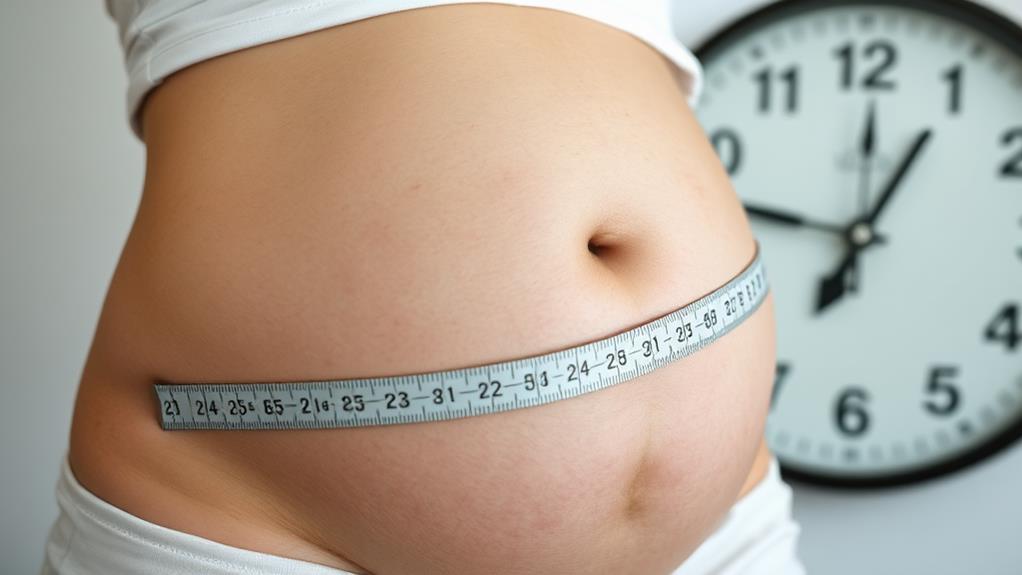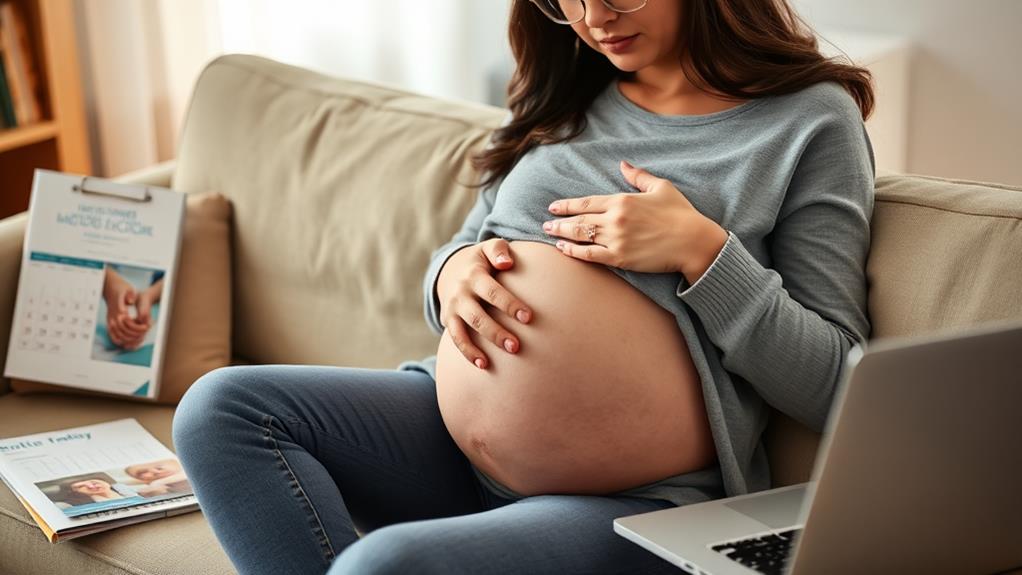Baby Bump Growing Too Slow or Too Fast? What You Need to Know
You might be wondering how to gauge whether your baby bump is growing at a healthy rate. It's common to feel concerned if you notice your bump isn't expanding as expected or seems to be growing too quickly. Both scenarios can raise important questions about your pregnancy health. Understanding the factors influencing growth and recognizing the signs of potential issues can be essential. But what should you look for, and when is it time to consult your healthcare provider? The answers may surprise you, so let's explore this further.
Understanding Baby Bump Growth
When it comes to understanding baby bump growth, you might find yourself wondering what's normal and what's not. You're not alone! Many expectant parents feel a mix of excitement and concern as their bodies change.
Typically, you'll notice your baby bump starting to grow around the 12-week mark. This is when your uterus expands, and it can feel like magic!
As the months roll on, you can expect your bump to grow steadily. By the end of your second trimester, most bumps are pretty noticeable, and you might even get some playful comments from friends and family.
But remember, every pregnancy is unique; some bumps grow quickly while others take a little more time.
It's essential to keep track of your growth, but don't stress too much if yours doesn't match what you see on TV or social media. The most important thing is that your little one is healthy and kicking away inside!
Factors Influencing Growth Rate
Several factors play a role in how quickly your baby bump grows throughout pregnancy.
First off, genetics is a big player. If your mom had a particular growth pattern, you might notice similar trends.
Then, there's your body type. If you're petite, your bump might show sooner than if you have a taller frame.
How many babies you're carrying matters too. Twins or triplets? Well, your bump's gonna be bigger and grow faster.
Plus, your diet impacts growth. Eating a balanced diet rich in nutrients helps your baby thrive. So, snack wisely!
Your activity level also plays a part. If you're staying active, your body might handle the changes differently than if you're on the couch binging your favorite series.
Stress can affect your growth too, so take some time to relax and pamper yourself.
Lastly, remember that every pregnancy is unique. Your doctor can help you understand how these factors apply to you.
Normal Growth Patterns

Understanding normal growth patterns can help you feel more at ease during your pregnancy. As your baby grows, it's important to know what to expect. Typically, by the end of your first trimester, your baby is about the size of a lime.
In the second trimester, they'll grow rapidly, reaching about the size of an avocado by week 20. That's when your belly really starts to show! By the third trimester, your little one will be getting close to the size of a watermelon, ready for their big debut.
Every baby is unique, so don't stress if your bump isn't the same size as someone else's. Some babies like to grow at their own pace, and that's perfectly normal. You might even notice fluctuations in size from week to week, and that's okay too!
Just remember, the best way to keep track of your baby's growth is through regular check-ups with your healthcare provider. They'll measure your belly and check your baby's heartbeat, ensuring everything's on track.
Signs of Slow Growth
While most pregnancies progress smoothly, there are instances where you might notice signs of slow growth in your baby bump. It's important to stay aware of these signs, as they can provide clues about your baby's development.
One thing to watch for is if your bump isn't growing as much as it should between prenatal visits. If you're suddenly feeling less movement or your belly feels smaller than expected, it's essential to mention this to your doctor.
Another sign is if you've gained less weight than recommended for your stage of pregnancy. While everyone's body is unique, significant weight loss or stagnation can sometimes indicate a problem.
You might also notice that your belly shape seems different, or you're not experiencing the usual pregnancy symptoms, like increased energy or cravings.
If you're feeling worried, don't hesitate to talk to your healthcare provider. They're there to help!
Signs of Rapid Growth

A rapidly growing baby bump can be an exciting sign that your little one is developing as expected. You might notice your belly expanding quickly during certain trimesters, especially the second. As your baby grows, you may feel a mix of joy and surprise when you catch a glimpse of your changing shape in the mirror.
Other signs of rapid growth include increased movement. If your baby's little kicks and jabs are becoming more frequent and stronger, it could mean they're growing well. You might also notice a change in your appetite; as your baby needs more nutrients, you may find yourself craving snacks more often.
Another indicator is the way your clothes fit. If your favorite outfits are suddenly too snug, it's a clear sign your bump is growing!
Plus, you may experience some lovely round ligament pain as your body adjusts to make room for your little one. While it can feel a bit uncomfortable, it's a normal part of this beautiful journey.
Potential Health Concerns
As your baby bump grows, it's essential to stay aware of potential health concerns that might arise during your pregnancy. You might notice some changes that seem a bit odd or concerning, and that's completely normal!
For instance, if your bump grows too quickly, it could be a sign of excess amniotic fluid or even gestational diabetes. But don't worry; these issues can often be managed with the right care.
On the flip side, if your bump isn't growing as expected, it could signal that your baby isn't getting enough nutrients or that there's a problem with the placenta. While that sounds scary, keeping an eye on your growth and discussing any worries with your doctor can help.
When to Seek Help

Noticing changes in your baby bump's growth can be concerning, and knowing when to seek help is important for your peace of mind. If your bump seems to be growing too slowly or too quickly, don't hesitate to reach out to your healthcare provider. It's always better to ask questions and get reassurance than to worry in silence.
Pay attention to other symptoms, too. If you're feeling unusual pain, experiencing severe swelling, or have any sudden changes in your body, it's time to make that call. Remember, you know your body best! If you feel something's off, trust your instincts.
Sometimes, a simple conversation can ease your mind, or it might lead to helpful advice. Doctors have seen it all, so don't feel embarrassed about asking if your bump's growth seems a bit wonky.
And hey, pregnancy can feel like a rollercoaster ride, with ups and downs. That's why staying connected with your healthcare team can help you feel more secure.
Tips for Healthy Growth
Maintaining a healthy baby bump growth involves a mix of balanced nutrition, regular check-ups, and self-care practices.
First off, think of your body as a plant that needs proper nutrients to grow strong. Eating plenty of fruits, veggies, whole grains, and protein is key. Don't forget to drink enough water—staying hydrated is super important!
Next, make those regular check-ups with your doctor a priority. They'll help monitor your baby's growth and offer personalized advice. Plus, it's a great time to ask questions, so don't be shy!
Self-care is just as essential. Take time to relax, whether it's through yoga, reading, or just taking a nice, long bath. Stress can affect your bump's growth, so find activities that help you unwind.
Lastly, listen to your body. If you're feeling tired, it's okay to take a break. Remember, every baby grows at their own pace, and you're doing great!
With these tips, you'll support your little one's journey and enjoy this special time. So, embrace the bumps (literally) and celebrate each milestone along the way!














Post Comment